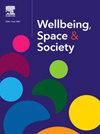感知很重要:身体邻里劣势和老年人的情绪健康
IF 2.2
Q2 GEOGRAPHY
引用次数: 0
摘要
对于65岁及以上的成年人来说,社区环境可能是成功变老的避风港,也可能是慢性压力的来源,尤其是当社区被认为是弱势群体时。因此,邻里压力源会对老年人的情绪健康和幸福产生负面影响,特别是在焦虑和愤怒方面。利用压力过程模型,本研究探讨邻里不利的感知是否影响老年人的情绪健康(即焦虑和愤怒)。此外,本研究还测试了掌握是否是一种可行的社会心理资源,有助于缓和和/或调解感知到的邻里劣势的影响。最后,从交叉性和社会化理论出发,我还研究了这些关系是否因种族-性别群体地位而异。本研究的数据来自健康与退休研究(HRS;N = 7106)。利用结构方程建模(即通径分析)来回答研究中的研究问题。路径分析的结果显示,感知到的邻里劣势与焦虑和外化愤怒(即愤怒)的增加有关。此外,精通程度的降低可以部分解释邻里劣势对焦虑和愤怒情绪的影响。也有证据表明,种族-性别群体地位有所缓和。这项研究的结果表明,老年人对社区物理压力源的看法可能会对他们的情绪健康产生有害影响。本文章由计算机程序翻译,如有差异,请以英文原文为准。
Perceptions matter: Physical neighborhood disadvantage and older adults’ emotional health
For adults aged 65 and older, the neighborhood environment can be a haven for successful aging or a source of chronic stress, especially if the neighborhood is perceived as disadvantaged. Consequently, neighborhood stressors can negatively affect older adults’ emotional health and wellbeing, particularly with regards to anxiety and anger. Utilizing the stress process model this study examines whether perceptions of neighborhood disadvantage affect older adults’ emotional health (i.e., anxiety and anger). In addition, this study tests whether mastery is a viable psychosocial resource that helps moderate and/or mediate the effects of perceived neighborhood disadvantage. Finally, drawing from intersectionality and socialization theories, I also investigate whether these relationships vary by race-gender group status. Data for this study are from the Health and Retirement Study (HRS; N = 7106). Structural equation modeling (i.e., path analysis) was utilized to answer the research questions in the study. Results from the path analysis reveal that perceived neighborhood disadvantage is associated with increased anxiety and externalized anger (i.e., anger-out). Moreover, reduced mastery explains part of the effect of neighborhood disadvantage on anxiety and anger-out, respectively. There is also evidence of moderation by race-gender group status. The findings from this study demonstrate that older adults’ perceptions of physical neighborhood stressors matter in ways that can have a deleterious impact on their emotional health.
求助全文
通过发布文献求助,成功后即可免费获取论文全文。
去求助
来源期刊

Wellbeing Space and Society
Social Sciences-Social Sciences (miscellaneous)
CiteScore
2.70
自引率
0.00%
发文量
46
审稿时长
124 days
 求助内容:
求助内容: 应助结果提醒方式:
应助结果提醒方式:


